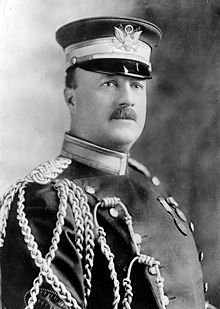
This is a story of two heroes.

Francis Davis Millet was born in Mattapoisett, Massachusetts. At age sixteen, Millet entered the Massachusetts regiment, first as a drummer boy and then a surgical assistant (helping his father, a surgeon) in the American Civil War. He graduated from Harvard with a Master of Arts degree. He worked as a reporter and editor for the Boston Courier and then as a correspondent for the Advertiser at the Philadelphia Centennial Exposition.
He became a member of the Society of American Artists in 1880, and in 1885 was elected as a member of the National Academy of Design, New York and as Vice-Chairman of the Fine Arts Committee. He was made a trustee of the Metropolitan Museum of Art, and sat on the advisory committee of the National Gallery of Art. He was decorations director for the World's Columbian Exposition in Chicago in 1893, where he is credited with having invented the first form of spray paint. His career included work with a number of worlds' fairs, including Vienna, Chicago, Paris, and Tokyo, where he made contributions as a juror, administrator, mural painter/decorator, or adviser.
Millet was among the founders of the School of the Museum of Fine Arts, Boston, and was influential in the early days of the American Federation of Arts. He was involved with the American Academy in Rome from its inception and served as Secretary from 1904-1911.

Major Archibald Willingham Butt (September 26, 1865 – April 15, 1912) was an influential military aide to U.S. presidents Theodore Roosevelt and William Howard Taft. Before becoming an aide to Roosevelt, Butt had pursued a career in journalism and served in the Spanish-American War.
Millet was among the founders of the School of the Museum of Fine Arts, Boston, and was influential in the early days of the American Federation of Arts. He was involved with the American Academy in Rome from its inception and served as Secretary from 1904-1911.

Major Archibald Willingham Butt (September 26, 1865 – April 15, 1912) was an influential military aide to U.S. presidents Theodore Roosevelt and William Howard Taft. Before becoming an aide to Roosevelt, Butt had pursued a career in journalism and served in the Spanish-American War.
On January 2, 1900, Butt received a commission as a Captain of United States Volunteers in the United States Army. He served in the Philippines from 1900 to 1904. In 1904, he was made Depot Quartermaster of Washington, D.C., where he met President Theodore Roosevelt. In 1906, he was sent to Cuba to as part of a pacification force. In 1908, now a captain, Butt was recalled to Washington to serve as chief military aide to President Roosevelt. When William Howard Taft became President the following year, Butt stayed on in the same capacity. In 1911, Butt was promoted to the rank of major.
Millet was known as a homosexual at the time of his death. He and Major Butt were living together and traveled together as partners when Major Butt went to Europe to recover his health before the presidential primaries of 1912.
One hundred years ago this morning both men were seen helping women and children board the lifeboats on the Titanic with no thought to their own lives, and then retiring to the smoking cabin to spend their last moments together.
In 1913, The Butt-Millet Memorial Fountain, named for both Archibald and Francis, was constructed near the White House in the Ellipse.
Taken from Wikipedia here and here.
Millet was known as a homosexual at the time of his death. He and Major Butt were living together and traveled together as partners when Major Butt went to Europe to recover his health before the presidential primaries of 1912.
One hundred years ago this morning both men were seen helping women and children board the lifeboats on the Titanic with no thought to their own lives, and then retiring to the smoking cabin to spend their last moments together.
In 1913, The Butt-Millet Memorial Fountain, named for both Archibald and Francis, was constructed near the White House in the Ellipse.
Taken from Wikipedia here and here.